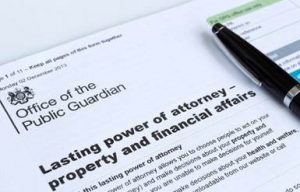A Lasting Power of Attorney (an LPA), is a document that can protect you if you become unable to look after your own affairs, for instance as you grow older. You can choose who you would like to be your attorney and look after your interests for you. It is usually a spouse or adult child, but can also be a neighbour or friend. It needs to be someone you trust completely to act in your best interests. For more information download our free guide: Lasting Powers of Attorney.
A special type of LPA is a commercial LPA, which protects your business if you become incapacitated – or just stranded abroad. It allows someone else to pay the bills, deal with the bank, etc., until you return to the office.
Why Is An LPA Needed?
A typical situation where an Lasting Power of Attorney would be helpful is where someone develops Alzheimer’s, usually in later life. They will often lose the capacity to make decisions about their finances and their health and care. However, an LPA is recommended at almost any age, so that if you are injured, or have an unexpected major health problem such as a stroke, your needs can be looked after.
No-one can make decisions on your behalf unless they have authority to do so. If you have not appointed an attorney through an LPA, it will mean that no-one can access your bank accounts or finances, or make decisions about health and care, even if they are your next of kin.
What Is ‘Capacity’?
Capacity is a legal term for being able to make your own decisions, and understanding the consequences and impact of those decisions at the time you are making them. You can lack capacity sometimes or all the time. Lack of capacity usually come from an illness or accident, but can come from a condition at birth.
To make an LPA, you need to have capacity at the time you make it. That means that you understand the implications of what you are doing.
What Happens If There Is No LPA?
If there is no LPA, and you become unable to make decisions on your own behalf, then it may mean that your family have to make a formal application for authority to do so. If they are given permission, they would become your ‘deputy’. This process is much more complicated and expensive than putting an LPA in place.
The responsibilities of a deputy are greater than for an attorney. For instance, a deputy has to produce accounts showing all income and expenses, and an annual written report to explain the decisions they’ve made. They may also have to endure supervision visits from the Office of the Public Guardian.
Different Types Of LPA
There are two types of LPA: one for property and financial affairs, and another for health and welfare. You can make one or other or (preferably) both at the same time. The attorneys do not have to be the same in each LPA, but they usually are.
With a property and financial affairs LPA in place, your attorney can access your bank accounts, your benefits and even sell your property on your behalf. With a health and welfare LPA, your attorney is able to make decisions about your day-to-day care, medical decisions, what you wear and eat.
A commercial LPA – mentioned above – will generally be restricted only to your business affairs. You can have different attorneys for a commercial LPA and a general LPA.
How Do I Make An LPA?
To make an LPA you complete the forms, pay a fee, and register the LPA with the Office of the Public Guardian. The forms are fairly complicated, and about 12,000 are rejected every year because of mistakes. Many people instruct a lawyer to prepare the forms and ensure that they are valid.
The health and welfare LPA cannot be used unless and until you lose capacity. If you never lose capacity, it can never be used. The property and financial affairs LPA can be used while you still have capacity, although this does not mean that you lose the right to manage your own affairs.
It is important to take advice about a particular set of circumstances. Call us today to discuss your situation and how we can help.
Make A Free Enquiry
Our solicitors are experts in this sector and are able to serve customers throughout Monmouthshire, Chepstow, the Forest of Dean and across England and Wales.
All initial enquiries are completely free of charge. Fill in the form to send us your details, and we will contact you to discuss making an LPA.







